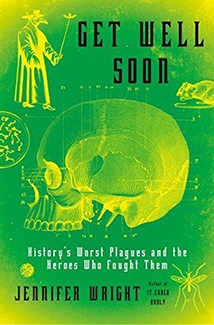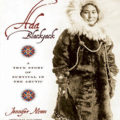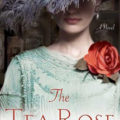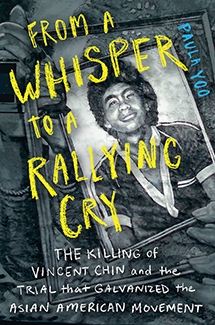I have an affiliate relationship with Bookshop.org and Malaprop's Bookstore in beautiful Asheville, NC. I will earn a small commission at no additional cost to you if you purchase merchandise through links on my site. Read more on my affiliate page.
My Synopsis:
Jennifer Wright explores thirteen (Coincidence? I think not.) plagues and they ways in which they were (mis?)handled with wry wit astute observations. Chapters include the Antonine, Bubonic (Black), and Dancing plagues; smallpox; syphilis; tuberculosis; cholera; leprosy; typhoid; Spanish flu; Encephalitis lethargica; lobotomies; and polio. Published in 2017, the book also contains almost prescient predictions about future plagues.
My Review:
I was pretty stressed out when the current pandemic started and spent way too much doomscrolling on social media and on the phone with my parents telling them not to leave their house for anything. When you’ve lived within a 30-minute drive of your parents for 41 years and suddenly find yourself on the opposite coast from them when a pandemic starts, you get more than a little worried. I did anyway.
So when one of my high school classmates–a librarian, author, and occasional book blogger–suggested that I read Get Well Soon, I don’t know why I listened. Don’t get me wrong; Jessica makes excellent book recommendations. But doesn’t reading about plagues in the middle of a pandemic when you’re already stressed out sound like a bad idea? But Jessica assured me that it was funny and interesting so I downloaded it from the library. She actually recommended the audiobook but I don’t absorb nonfiction very well when I listen to it, so e-book it was.
This book fascinated me from the moment I started reading. I made heavy use of the highlight function on my Kindle, highlighting 53 passages. 53! I would like to share them all here but I believe that would get me in trouble for copyright infringement.
This book about plagues was somehow hilarious! I’ve worked healthcare for decades though and I can have quite a sense of gallows humor. Anyway, in discussing cholera, I believe, she writes,
“And then there was the livestock that people kept inside their houses. We’re not talking about livestock in the sense of ‘a few people had some chickens.’ We’re talking cows in the attics. They’d be levered up by pulley and kept in the attic as long as they had milk to give. (If I had such a cow, I would name her Bertha Mason.)”
And then there’s
“If you were as bony as someone with consumption, you must have been depriving yourself in this world to feast with Jesus in the next.”
Or this little nugget
“Whenever someone casually refers to ‘the history of civilization’ in a way that does not jibe with the history of civilization as I extensively, constantly, read about it, I like to research their favorite books to see where they are getting their information. In most of these cases all their favorite books have titles like Christmas, Guns, and Integrity.”
I found the history of the book fascinating as well. Wright asserts that there’s some proof that the Antonine plague had more to do with the fall of Rome than the encroachment of Germanic tribes did. The “Spanish flu” pandemic in 1918 most likely started in Kansas. WWI laws regulating the press kept most North American and European countries from reporting on this disease that was killing healthy, young soldiers left and right. But Spain was neutral in WWI so their journalists were the first to widely report on the pandemic. This wrongly led the public to believe that it originated there. I also didn’t realize that some young women actively tried to catch tuberculosis because it tended to make them beautiful as they wasted away and slowly suffocated. This is just the tip of the historical iceberg.
Parts of the book were infuriating and/or maddening. I’m not quite sure how lobotomies made it into a book about plagues (Maybe it should be called the “Walter Freeman II Plague”), but this chapter in particular made me furious.
“Mentally ill women were generally institutionalized by their husbands or fathers—without consent required—and, until the 1960s, doctors were not obliged to reveal their treatments or risks to the patients. ‘I usually asked the family to provide the patient with sunglasses [for their black eyes postoperation] rather than explanations,’ Freeman joked. Somewhere between 60 and 80 percent of lobotomies were performed on women, despite a greater percentage of men being institutionalized.”
Wright also shows that human behavior really doesn’t change. We don’t remember history very well and we definitely don’t learn from it.
“[When] plagues erupt, some people behave amazingly well. They minimize the level of death and destruction around them. They are kind. They are courageous. They showcase the best of our nature. Other people behave like superstitious lunatics and add to the death toll.”
Doesn’t that sound familiar?
“During crises like the Antonine plague, being a problem solver is the best thing you can be. When we are electing government officials, it is not stupid to ask yourself, ‘If a plague broke out, do I think this person could navigate the country through those times, on a spiritual level, but also on a pragmatic one? Would they be able to calmly solve one problem, and then another one, and then the next one? Or would bodies pile up in the streets?’ Certainly, it would be better than asking yourself if you would enjoy drinking a beer with them.”
If only more of us evaluated candidates this way.
But the subtitle of the book is History’s Worst Plagues and the Heroes Who Fought Them. (emphasis added). So that was the part that ultimately spoke most to me and my COVID-rattled spirit. In each chapter, the author outlines the disease, the idiotic things people did in efforts to combat or ignore it, and then she gives us a hero who helped mitigate the death toll or someone who stepped up just to ease someone else’s suffering.
“He may not have found a cure—because not everyone’s role is ‘being a doctor’—but his bravery raised awareness and inspired others to work for one. Not all of us can be expected to live up to Damien’s legacy, and not everyone needs to. There are lots of ways to help people on a smaller scale and without endangering your own health. But Damien is a reminder that you don’t have to be a genius or a brilliant scientist or a doctor to help in this war against disease: you just have to be someone who gives a damn about your fellow man.”
This obviously isn’t going to be for every reader, especially given the ongoing COVID-19 pandemic. If you like quirky science books with funny, incisive observations, this is the book for you. I have a feeling it’s going to make it into my top ten books of the year.
Recommended by:
Jessica at Book Ouroboros
Similar Books:
If you liked Get Well Soon: History’s Worst Plagues and the Heroes Who Fought Them, you might also like my reviews of
- Stiff: The Curious Lives of Human Cadavers by Mary Roach
- The Immortal Life of Henrietta Lacks by Rebecca Skloot, read by Cassandra Campbell and Bahni Turpin
- A Short History of Nearly Everything by Bill Bryson
Purchase:
Buy Get Well Soon: History’s Worst Plagues and the Heroes Who Fought Them from Malaprop’s Bookstore in Asheville, NC.










5 Comments
This sounds so good! I definitely think I could enjoy a book with a humorous approach like this, even during the current pandemic, especially since it sounds like the author offers a decent amount of hope 🙂
She does offer hope as well as humor! I can’t recommend this enough to those who are interested.
Absolutely adding this to my WTR list, great review!
Thanks! It was a fabulous book.
Oh man, I really have to read this one! But you’re right, I never would have thought that reading it *now* would be a good idea, either. Maybe I should pick it up now after all…